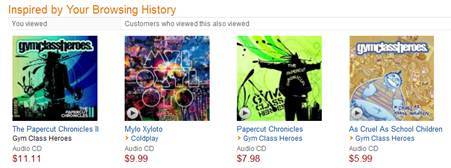I’ve long been in search of music nirvana – the digital equivalent of knowledgeable music merchandisers at my beck and call, eager to recommend artists that would astonish and delight my eclectic tastes. I’ve been eagerly anticipating the hype since the Pattie Maes days, back when it was called “intelligent agents” and the program in question was called HOMR (Helpful Online Music Recommendations). But 15 years later, I realize that there’s something to be said for the record store geeks of old and the type of recommendations that they would provide.
If I could, I’d beat my way back to the beleaguered record store, with my head hung low after abandoning them for the past decade. This is not a belated swan song though. You see, I’m desperate. Call me the Artificial Intelligence curmudgeon, but I don’t think recommendations engines are quite there yet.
But the fact of the matter is I still haven’t seen the Promised Land. When your tastes deviate from the mainstream, “What’s Hot” and “Top 10 Bestsellers” and “People who bought this, also bought that” aren’t going to cut it. I want a recommendations engine to get subtle complexities. One that understands not everyone’s tastes fit into a single neat and tidy genre bucket. That one’s music tastes and demographics may not necessarily go hand in hand. That there’s such a thing as an inconsistent artist, say, good Stevie Wonder and the Terrible, Horrible, No Good, Very Bad Stevie Wonder. Most of all, I want it to surface up artists that I am unlikely to discover myself – and that the common element between its recommendations is that it’s good, not because it’s just like something else I—or someone just like me—bought or liked.
Instead, recommendations engines behave just as they are – automated machines that make assumptions based on historical data. They incessantly and predictably recommend more of the same – Like the Beatles? You might like…more Beatles! When they do stray from the obvious, they cater almost exclusively to consumers who can be pegged to certain genres. For consumers who don’t fit that mold, it takes a hefty time investment of tweaking and “fixing” search history and rating countless albums, and still Amazon, iTunes & its musical ecommerce brethren fall short. Is that really progress? Frankly, it seems like a lot of work. And let’s face it, most sites don’t make rating products or reading product reviews a particularly enjoyable experience.
Furthermore, feeding the machine with artists you like, or rating your past purchases, can quickly lead to a musical rut. Following friends on sites such as last.fm only works if your friends have time on their hands and similar tastes. Finding new virtual “friends” whose tastes are more in line with your own is time-consuming and can be very hit and miss. Tracking the “wisdom of crowds” often means a slightly different version of a “Most Popular” list is being served up.
While it may be passé in this personalized, digital content age, sometimes it really just seemed like it was faster, easier and perhaps most importantly, more enjoyable to go to a store and interact with a knowledgeable clerk/music enthusiast. You would briefly describe your tastes and then ask them what they’d recommend… then sit back and wait for an enthusiastic rapid-fire pelleting of artists that you must simply listen to.
Truth be told, these days I resort to closely reviewing e-newsletters (yes, pure text!) that I receive from stores like M-Theory Music and then manually look for sample tracks online to see if I like the artist or not. I make a point to listen to niche radio programs for inspiration. Sometimes I will add a few more wild cards into the mix: I’ll “spy” over at the Hype Machine and listen to its downloadable radio show; sometimes I’ll choose a tag over Stereomood or queue up a DJ’ed show over at Mixcloud. Interestingly, what these activities in common is that they have nothing to do with personalization, my history or existing playlist. Sure I have self-selected themes or styles, but then I abdicate control.
And so, though it’s unfashionable to admit, I believe there’s something to be said for handing over the reins to a trusted, expert curator.

